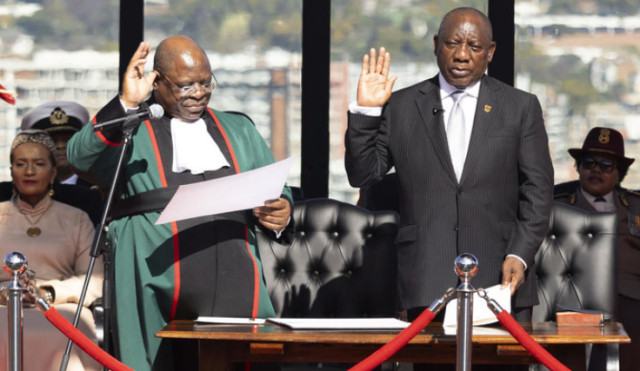South Africa’s Cyril Ramaphosa has been sworn in for the second term as president of the country, marking a beginning of a new era.
This became possible after his party, African National Congress (ANC), struck a hard-won government coalition deal to remain in power.
Lawmakers voted overwhelmingly to re-elect the 71-year-old after a May 29 general election produced no outright winner for the first time in three decades.
“The formation of a government of national unity is a moment of profound significance. It is the beginning of a new era,”
Ramaphosa said, after taking the oath of office during a ceremony at the Union Buildings, the seat of government, in Pretoria.
“The voters of South Africa did not give any single party the full mandate to govern our country alone,” he added, speaking before lawmakers, foreign dignitaries, religious and traditional leaders and cheering supporters.
“They have directed us to work together to address their plight and realise their aspirations.”
Ramaphosa is expected to announce his cabinet in the coming days, as talks with coalition members continue.
Various countries heads of state were present at the inauguration to grace the occasion, including Nigerian President Bola Ahmed Tinubu, Angola’s Joao Lourenco, Congo Brazzaville’s Denis Sassou Nguesso and Eswatini’s absolute leader King Mswati III among others.
VIPs were sighted chanting anti-apartheid struggle songs, other attendees held the country's flag with interlude of musical performances.
Ramaphosa who was sworn in today faced a strong opposition with Malema’s Economic Freedom Fighters and former president Zuma’s uMkhonto weSizwe (MK) refusing to take part and denouncing the inclusion of right-wing parties and the white-led, free-market DA.
Party spokesman Nhlamulo Ndhlela said in a statement ahead of the ceremony that its lawmakers would snub the “farcical inauguration of Cyril Ramaphosa as the puppet DA-sponsored President."
But Ramaphosa said, “We must reject every attempt to divide or distract us, to sow doubt or cynicism, or to turn us against one another.
"As leaders, as political parties, we are called upon to work in partnership towards a growing economy, better jobs, safer communities and a government that works for its people.”
AFP




















